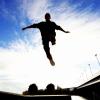Parkour-Vienna.at ist seit 2021 ein read-only Archiv
Die aktive Community ist unter Parkourvienna.at erreichbar
Angeleitete Trainings & professionelle Anfragen: Parkour-Austria.at
Sign in to follow this
Followers
0

Distillation: Refining the Spirit of Parkour
Started by
TOM,
Sign in to follow this
Followers
0
